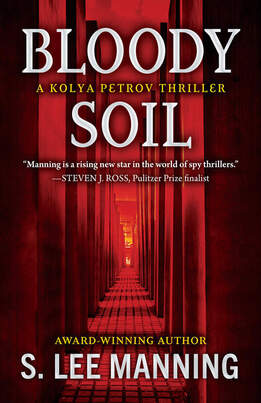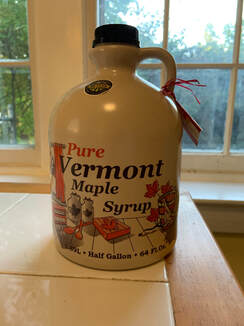
I didn't plan this and neither did my publisher, but my latest novel, Bloody Soil, is launching on November 9, 2022, which also happens to be the 84th anniversary of Kristallnacht. There is an eeriness to this, given that Bloody Soil revolves around the danger from a resurgent Nazi group in modern day Germany, and Kristallnacht was the event which marked the movement from discrimination and persecution into violence against the Jewish population in Nazi Germany. It is especially eerie at this time, given the frightening rise of antisemitism throughout the world.
I wish I could say that the neo-Nazis described in my novel existed only in my imagination. Unfortunately, I can't. Bloody Soil is based on real incidents. In Germany, a neo-Nazi group embarked on a killing spree over a period of ten years, targeting immigrants and those who supported them. Then there was Day X - a plot by a neo-Nazi group to kidnap elected officials that they deemed to be traitors, kill them, put their bodies in body bags, and then bury them in quicklime. While the events in my novel aren't an exact duplication of these events, my plot was inspired by that reality.
I also wish I could say that the antisemitism described in Bloody Soil is fictional or relegated to the past. It's not. The antisemitic rhetoric is getting louder, and the silence of some who should be pushing back is deafening. That my book is coming out on the anniversary of Kristallnacht isn't the only thing that is unsettling.
Kristallnacht occurred on November 9, 1938, when the SS and the SA were joined by Hitler youth and German civilians in attacking Jewish business, homes, synagogues, and people - 7500 homes or businesses were destroyed, 30,000 Jewish men were sent to concentration camps, and almost 300 synagogues were destroyed. The official death toll was ninety-one, although more recent history suggests that hundreds were killed. It was the beginning of the murder of two thirds of Europe's Jewish population.
It feels personal to me, as it does to so many Jews, and not only because I know that but for time and space, I and my entire family would have been brutally murdered for nothing more than being born of Jewish heritage. My grandparents who left what is now Ukraine and Lithuania before World War I still had family in that area until Nazis murdered them. Those still in Ukraine were stripped naked, lined up at a pit called Babi Yar, and shot. I believe those in Lithuania were locked in a synagogue and burned alive. (Both massacres are described in Bloody Soil.) My uncle's mother and sister were gassed on arrival at Auschwitz, and he spent his teenage years forced to carry the dead from the gas chambers to the furnaces.
The Holocaust didn't actually begin with Kristallnacht, though. It began with lies, with respectable people allowing hatred of Jews to go unchecked. The Nazis stated that Jews were responsible for World War I, for Germany's defeat, for economic oppression. They proclaimed that there was a world-wide Jewish cabal plotting to take over the world, and Jews were portrayed not just as puppet masters but as sexual deviants and degenerates. The fact that the lies were inconsistent didn't matter - Jews were both the international bankers, profiting off capitalism, and Jews were behind international communism, planning to destroy capitalism. Notably it wasn't just the Nazis saying these things. Here in the United States, Henry Ford wrote news articles in his own newspaper saying the same kind of things. Those words were echoed by an antisemitic priest, Father Coughlin and by Charles Lindberg. The antisemitism in the US didn't just echo that of the Nazis, it prevented action to rescue some of the Jewish men, women, and children who perished, as illustrated in Ken Burn's recent documentary.
In the aftermath of the Holocaust, as I was growing up, Jews in America experienced a golden era of acceptance. The neo-Nazis were a handful of freaks and kooks, living in their mothers' basements typing manifestos. While some people (and private clubs) continued to distain Jews, most doors opened. Jews were able to work, live, and go to schools in places that a few years earlier wouldn't have accepted them. Antisemitism may have been muttered behind closed doors, but it wasn't out in public. It wasn't mainstream.
It's out again. The same conspiracy tropes. The same hatred. It's coming from far-right extremists, from people who embrace the same conspiracy theories about powerful world-wide Jewish cabals, and from the antizionists on the left who, sadly, echo some of the rhetoric about Jewish people but use the term, Zionism while claiming not to be antisemitic. It's in Europe, where Bloody Soil is placed, and it's in America.
Jews are the smallest religious minority in America, less than two percent of the population, and yet attacks on Jews account for more than 60 percent of all religious hate crimes. In 2021, the highest number of hate crimes against American Jews were recorded. As I sit here on a Sunday afternoon, neo-Nazis have been projecting hate messages about Jews onto the sides of buildings and billboards at football games.
Jewish people are increasingly uneasy about the rising sounds of hate. We've heard this before, and it doesn't end well.
And, so I'm writing a series with a secular Jewish protagonist working as an American intelligence operative. When I started this, I liked the idea of creating a protagonist from an unlikely background, since few novels in this genre have a Jewish American (let alone Russian Jewish immigrant) as the hero. It's especially important now to see Jewish people in heroic roles. Maybe the publication of a novel about a neo-Nazi plot foiled by a Russian Jewish immigrant to the United States on the anniversary of Kristallnacht in a time of growing antisemitism isn't eerie after all. Maybe it's appropriate.
I wish I could say that the neo-Nazis described in my novel existed only in my imagination. Unfortunately, I can't. Bloody Soil is based on real incidents. In Germany, a neo-Nazi group embarked on a killing spree over a period of ten years, targeting immigrants and those who supported them. Then there was Day X - a plot by a neo-Nazi group to kidnap elected officials that they deemed to be traitors, kill them, put their bodies in body bags, and then bury them in quicklime. While the events in my novel aren't an exact duplication of these events, my plot was inspired by that reality.
I also wish I could say that the antisemitism described in Bloody Soil is fictional or relegated to the past. It's not. The antisemitic rhetoric is getting louder, and the silence of some who should be pushing back is deafening. That my book is coming out on the anniversary of Kristallnacht isn't the only thing that is unsettling.
Kristallnacht occurred on November 9, 1938, when the SS and the SA were joined by Hitler youth and German civilians in attacking Jewish business, homes, synagogues, and people - 7500 homes or businesses were destroyed, 30,000 Jewish men were sent to concentration camps, and almost 300 synagogues were destroyed. The official death toll was ninety-one, although more recent history suggests that hundreds were killed. It was the beginning of the murder of two thirds of Europe's Jewish population.
It feels personal to me, as it does to so many Jews, and not only because I know that but for time and space, I and my entire family would have been brutally murdered for nothing more than being born of Jewish heritage. My grandparents who left what is now Ukraine and Lithuania before World War I still had family in that area until Nazis murdered them. Those still in Ukraine were stripped naked, lined up at a pit called Babi Yar, and shot. I believe those in Lithuania were locked in a synagogue and burned alive. (Both massacres are described in Bloody Soil.) My uncle's mother and sister were gassed on arrival at Auschwitz, and he spent his teenage years forced to carry the dead from the gas chambers to the furnaces.
The Holocaust didn't actually begin with Kristallnacht, though. It began with lies, with respectable people allowing hatred of Jews to go unchecked. The Nazis stated that Jews were responsible for World War I, for Germany's defeat, for economic oppression. They proclaimed that there was a world-wide Jewish cabal plotting to take over the world, and Jews were portrayed not just as puppet masters but as sexual deviants and degenerates. The fact that the lies were inconsistent didn't matter - Jews were both the international bankers, profiting off capitalism, and Jews were behind international communism, planning to destroy capitalism. Notably it wasn't just the Nazis saying these things. Here in the United States, Henry Ford wrote news articles in his own newspaper saying the same kind of things. Those words were echoed by an antisemitic priest, Father Coughlin and by Charles Lindberg. The antisemitism in the US didn't just echo that of the Nazis, it prevented action to rescue some of the Jewish men, women, and children who perished, as illustrated in Ken Burn's recent documentary.
In the aftermath of the Holocaust, as I was growing up, Jews in America experienced a golden era of acceptance. The neo-Nazis were a handful of freaks and kooks, living in their mothers' basements typing manifestos. While some people (and private clubs) continued to distain Jews, most doors opened. Jews were able to work, live, and go to schools in places that a few years earlier wouldn't have accepted them. Antisemitism may have been muttered behind closed doors, but it wasn't out in public. It wasn't mainstream.
It's out again. The same conspiracy tropes. The same hatred. It's coming from far-right extremists, from people who embrace the same conspiracy theories about powerful world-wide Jewish cabals, and from the antizionists on the left who, sadly, echo some of the rhetoric about Jewish people but use the term, Zionism while claiming not to be antisemitic. It's in Europe, where Bloody Soil is placed, and it's in America.
Jews are the smallest religious minority in America, less than two percent of the population, and yet attacks on Jews account for more than 60 percent of all religious hate crimes. In 2021, the highest number of hate crimes against American Jews were recorded. As I sit here on a Sunday afternoon, neo-Nazis have been projecting hate messages about Jews onto the sides of buildings and billboards at football games.
Jewish people are increasingly uneasy about the rising sounds of hate. We've heard this before, and it doesn't end well.
And, so I'm writing a series with a secular Jewish protagonist working as an American intelligence operative. When I started this, I liked the idea of creating a protagonist from an unlikely background, since few novels in this genre have a Jewish American (let alone Russian Jewish immigrant) as the hero. It's especially important now to see Jewish people in heroic roles. Maybe the publication of a novel about a neo-Nazi plot foiled by a Russian Jewish immigrant to the United States on the anniversary of Kristallnacht in a time of growing antisemitism isn't eerie after all. Maybe it's appropriate.

 RSS Feed
RSS Feed